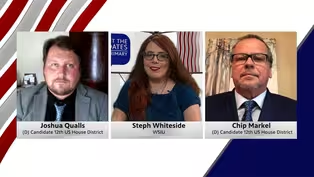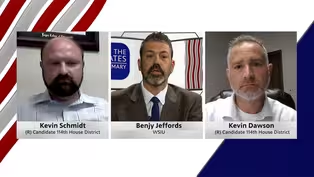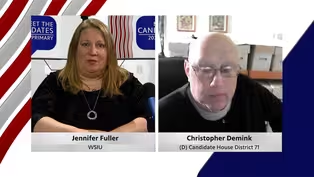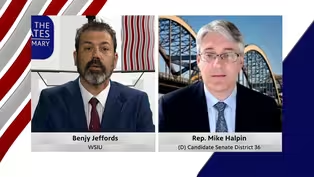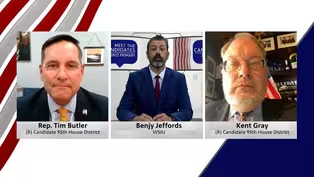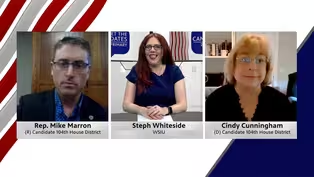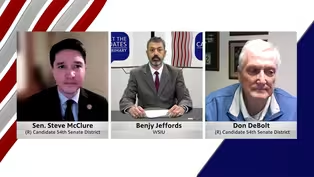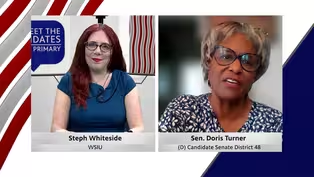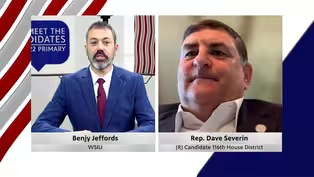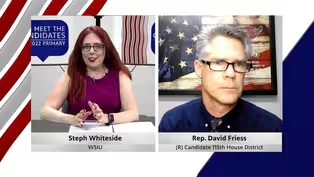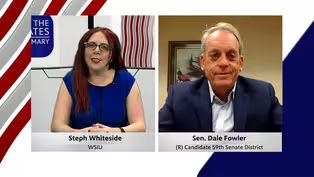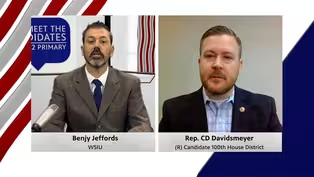Meet the Candidates
96th Illinois House District Primary Republican Candidates
4/21/2022 | 28m 45sVideo has Closed Captions
Candidates Prescott Paulin and Dr. Lisa Smith, running for the 96th House seat.
On this episode of Meet the Candidates, WSIU interviews candidates Prescott Paulin and Dr. Lisa Smith, running for the 96th House seat.
Problems playing video? | Closed Captioning Feedback
Problems playing video? | Closed Captioning Feedback
Meet the Candidates is a local public television program presented by WSIU
This series is produced in partnership with the League of Women Voters
Meet the Candidates
96th Illinois House District Primary Republican Candidates
4/21/2022 | 28m 45sVideo has Closed Captions
On this episode of Meet the Candidates, WSIU interviews candidates Prescott Paulin and Dr. Lisa Smith, running for the 96th House seat.
Problems playing video? | Closed Captioning Feedback
How to Watch Meet the Candidates
Meet the Candidates is available to stream on pbs.org and the free PBS App, available on iPhone, Apple TV, Android TV, Android smartphones, Amazon Fire TV, Amazon Fire Tablet, Roku, Samsung Smart TV, and Vizio.
Providing Support for PBS.org
Learn Moreabout PBS online sponsorshipMore from This Collection
Meet the Candidates features interviews with candidates running for Illinois state, House and Senate races. Guests will discuss key issues impacting Illinois voters such as the economy, the environment, education and public health. This series is produced in partnership with the League of Women Voters.
12th U.S. Congressional Seat Primary Candidate Forum
Video has Closed Captions
Joshua Qualls and Chip Markel, running for the 12th U.S. Congressional Seat. (25m 21s)
114th Illinois House District Primary Candidate Forum
Video has Closed Captions
Dr. Kevin Schmidt and Kevin Dawson, running for the 114th House District. (25m 57s)
71st House District Primary Candidate
Video has Closed Captions
Ahead of the June primary, WSIU talked with Christopher Demink, running for the 71st House (21m 35s)
36th Senate District Primary Candidate Forum
Video has Closed Captions
WSIU talked with 36th Senate District candidate Representative Mike Halpin. (26m 29s)
95th Illinois House District Primary Republican Candidates
Video has Closed Captions
Representative Tim Butler and Kent Gray, running for the 95th House District. (26m 58s)
104th Illinois House District Primary Candidates
Video has Closed Captions
104th House District candidates Representative (R) Mike Marron and (D) Cindy Cunningham. (26m 49s)
54th Illinois Senate District Primary Republican Candidates
Video has Closed Captions
54th Illinois Senate District Primary Republican Candidates forum. (25m)
48th Illinois Senate District Primary Democrat Candidates
Video has Closed Captions
48th Illinois Senate District Primary Democrat Candidates forum. (26m 46s)
116th Illinois House District Primary Republican Candidates
Video has Closed Captions
116th Illinois House District Primary Republican Candidates forum. (25m 9s)
115th Illinois House District Primary Republican Candidates
Video has Closed Captions
115th Illinois House District Primary Republican Candidates forum. (23m 14s)
59th Illinois Senate District Primary Republican Candidate
Video has Closed Captions
WSIU interviews Senator Dale Fowler from the 59th Senate District. (27m 29s)
100th Illinois House District Primary Republican Candidates
Video has Closed Captions
WSIU interviews candidate C.D. Davidsmeyer, running for the 100th House seat. (26m 9s)
Providing Support for PBS.org
Learn Moreabout PBS online sponsorship(upbeat music) (camera shutter beeping) (light upbeat music) - This is Meet the Candidates with Primary Candidates for the 96th House District.
I'm Steph Whiteside.
WSIU Public Broadcasting and the League of Women Voters are pleased to host today's forum.
The rules are simple.
Each candidate will have 60 seconds to answer the question and should not mention their opponent in their response.
Joining us today, are Prescott Paulin and Dr. Lisa Smith.
Representative Sue Scherer, who is also running in the primary declined our invitation to the forum.
Thank you so much for joining us.
Prescott, we'll start with you.
What is your number one priority if elected?
I know it can be hard to narrow it down, but please try to stick to just one.
- Thank you so much for your time and it's great to be here.
My number one priority if elected is fiscal responsibility.
I come from a family business here in Decatur, and the last few years been very hard for us.
We've been here nearly 30 years as a company, and I noticed that a lot of the policies in this state are not helping our entrepreneurs stay here, they're not helping our families stay here.
And they're, frankly, convincing people to move out of state.
And when people leave, that's less tax revenue for our state.
So the number one thing that I believe that we need in order to fix Illinois and make better change in this state is getting back to where we belong, being back in the black and being fiscally responsible.
- Thank you, Prescott.
Lisa?
- Thank you for letting us come on and give our opinions on these things.
I am very concerned about the high taxes in the state of Illinois.
My main concern is to bring taxes down for the families in the state of Illinois.
Right now we're looking at a really high gas tax, which we don't need.
And it seems like the Democrats have decided that the way to bring in revenue in our state is to tax the Illinois people.
And the high taxes are, like Prescott said, driving out businesses in this state and they're driving out people.
Look at all the people that are leaving our state, it's because our state is not a family or business friendly state.
And so my main thing is to go in and to see about lowering taxes and to decrease regulations for businesses so that we can bring in economic growth to our state and make it a friendly state for families and business.
Thank you.
- [Steph] Thank you.
Lisa, we'll start with you this time, what would make you an effective lawmaker if elected?
- Well, if anybody knows me, they know that I'm persistent.
I think that if I have an issue that needs to be addressed, I will be on the floor addressing it.
I will be talking to the other representatives and trying to collaborate with them, to get a bill that will help the Illinois people.
I mean, I've not succeeded at, I mean, I've not ever not succeeded at things that I want to get done, so I am very persistent.
I'm a very ethical person to represent our district that way ethically and persistently until we get the things done that will improve our district and improve our state.
- Thanks, Lisa.
Prescott?
- In addition to having a strong moral compass from having served in the United States Military as a Marine Corps officer, I also believe in listening to others.
I think that any good leader needs to take note of what its people, what his or her people are looking for in order to make improvements.
And this election is not about me.
It is about all of us trying to rise together in Illinois.
And one thing that I do exceptionally well is ask other people what they want and build it for them.
And the book that I'm releasing here in October, it's called agile party system.
It's how do we take community events and use that to help small businesses grow their revenue?
I'm helping small businesses learn how they can listen to others in their community and build events that are going to better serve them, which ultimately drives revenue.
And I think that any of us can use the same strategies in our own daily life, listening to what other people want and helping build it for them so that together we can all rise here in Illinois.
- Thank you.
For the next question, Prescott, the pandemic really exposed disparities in education funding.
What would you do to make sure schools in your district are able to meet the needs of families and students?
- Absolutely.
My mother has three sisters that are all educators and I grew up in a family of educators and listened to them quite frequently tell tales of what needs to be fixed.
I think it's frankly a shame that our previous governors have tapped into teachers pensions and robbed them of the future retirements that they were promised.
And I think that we need to do better as a community to find new sources of revenue and reduce the individual tax burden, move that over to corporations so that we can generate additional revenue for our state.
And that's ultimately gonna help us to refund, meaning add additional funds to the teacher's pensions, bring that balance back and also create additional tax revenue to deploy into our schools.
If you've ever taken a photo of a school lunch in our area, it is absolutely disgusting what we are forcing our children to eat.
There should be better food, should we better pay for teachers and better education for all of our future children.
- Thank you.
Lisa?
- It's very concerning about the school systems in our district.
We have many of our schools that are failing our kids.
Their scores are very low and it is just a shame.
The schools are very important to me.
We have 10 children that we have and we've adopted seven.
I have my kids all in public school.
The scores for the schools in our district are lacking.
They are below what they should be, and we have no recourse if we live in those districts and we don't have the money to send our kids to private school.
And it is a shame, it's really affecting minorities and the poor.
My plan is to really push for school choice.
I want schools to be competitive.
I want our tax money for our kids to follow the kids to the school that their parents want them to go to.
I want our schools to be teaching math, arithmetic, or math, science, you know, history and English instead of sex education and racism, which I believe is coming into our school in droves.
The governor passed a law that will do that and I want our schools to go back to the choice of the people.
Thanks.
- Okay, your time.
But thank you, Lisa.
And we're gonna start with you again.
The state budget is a major priority in Springfield.
Name three things that you would prioritize.
- So three things that I would prioritize in the budget would be, of course, tax cuts.
I wanted to cut taxes across the board for everyone to make it a friendly environment for businesses and families.
I want to decrease regulation on everything.
It seems like our government, our government here in Illinois, wants to stick their nose in every business and everything and regulate everything which is hindering businesses from coming into our state.
We need to balance the budget, we need to make a law, our legislators accountable for the money that we give them.
It needs to go to the programs that they say they're gonna go to.
It needs to not be sent to other programs whenever we pass something that says, it's gonna go to schools, it needs to go to schools, pass something that says it needs to go to roads, it needs to go to roads, and we need to keep our legislators accountable for that money and where it is going.
- Thank you.
Prescott?
- Thank you, and just so I understand the question, can I have you repeat that again, is what are the three budget priorities?
- Yes.
What would be the three things you would prioritize in the budget?
And if you are thinking about things to cut, don't worry, that's coming.
- Understood.
Thank you.
So, in terms of prioritization in the budget, one of the top things that I think we should prioritize is the ability to actually have leadership within our government, and specifically if we're paying government employees right now, there is a disincentive for union workers to go into management.
There are new union workers that have maybe been in for two or three years that are getting paid more than people that have switched from being a union employee over to management that have been there over 20 years are getting paid less.
And so there's an incentive for people not to become managers in our government.
And that to me is a huge discrepancy.
It's actually a line item controlled by our governor.
So this is not something that we as legislators could change, but in working with the governor's office and hopefully Darren Bailey will be governor.
Then we can improve the budget and make these things better.
But the budget priorities for me would be infrastructure and reducing the cost for starting small businesses, making the fees to create an incorporated business, reduce those.
- Thank you.
And now that we've talked about budget priorities, Prescott, what are the three things that you would cut?
- Absolutely.
So me personally, I think that I would pull before I make any decisions, this is not a heartfelt item, this to me is a very important thing that needs to be done line by line.
It needs to be done with conversations.
So in terms of having three priorities, I will not know that until I listen to other people, and I have these conversations are going to be tough conversations, because there's lots of special interest groups that are out there and they want to defend their piece of the budget.
But I think as a legislator, it is extremely important to say that whatever your three priorities are going to be, it is going to be as a result of listening to other people, figuring out why those things are important to them.
And in making the hard decisions to keep our state afloat.
That's where my mind and my heart will be, is not what I believe and what my heart tells me, just in terms of a financial budget.
It is absolutely conversations that must occur between everybody in the state.
And that's also the taxpayers.
- Thank you.
Lisa?
- Yes.
Well, I kind of agree with Prescott on that is that we don't really know right now, we'll have to get in there and see what's going on.
But I do have some idea that there are a lot of overlapping programs right now in our government that we're giving money and it's going out in overlapping providing services that are already being given by some other agency.
And I wanna look at that and see if we can kind of cut down on what the programs are doing and make sure they are pinpointing certain things and not overlapping.
There's programs that you know, that I don't want to fund like Prescott, or things that I know in my heart I want to not fund.
And we need to look at those and get with our constituents and find out yes, is that what they want to do and then try to get rid of those, and talk with everyone, just so we can all be on the same page and get these things pushed through because we have to work as a group, as the Republicans, to get these things passed and bring on some Democrats to do it too.
- Thank you.
For the next question, Lisa, we'll move on to some recent events.
Although the economy is recovering from the early stages of the pandemic, inflation is also on the rise.
What would you do to help Illinoisans who are finding their paychecks don't stretch as far as they did even a couple months ago?
- That's right.
Their paychecks aren't stretching, that's for sure.
I mean, we've got grocery bills that are at least 25% higher right now, we've got gas prices that are through the roof, just to go to work is costing people a fortune to put gas in their car to get there.
There's no easy fix for this.
This is a nationwide problem.
For one thing in our state, we could bring back down the gas tax that we put in, which was incredibly high.
And it's very hard on the people.
That's one thing they could look at.
And I have a feeling that they're gonna try to push that through before the elections so they can say that.
And when I say they, I mean the Democrats can do that and say, look what we've done.
But they are the ones that instituted that tax.
That gas increase affects everything and affects your grocery bill, affects every product that you get because it costs them more to get that to the grocery store.
It costs them more to get it to you.
So that is something that needs to be brought down.
But like I said, this is a nationwide issue.
This is not just an Illinois issue.
- Thank you.
Prescott?
- So one of the thought leaders that I very much respect and follow is Ray Dalio, and he just recently put out a video that has got over 10 million views now, it's on the principles of a changing world order and he looked at 500 years of history to see the rise and the fall of the Dutch, the rise and the fall of the Brits, the rise and now the fall of Americans.
And every time there was a fall and someone else was rising, there was a war and guess who's rising now, it's China.
And unfortunately the United States continues to print money at a high level in the federal government.
The decisions are causing the inflation with our currency.
And I believe that the only hedge against that is by implementing options for people to invest in cryptocurrencies and alternative funds in addition to being able to keep ahold of the US dollar and try to keep it afloat, as long as possible.
China would love to have its currency replace the United States and become the global reserve currency.
It is absolutely up to us as a state to do what Wyoming has done, and I'll talk more about this later, but Wyoming has just approved the first internet-owned corporation where usually it used to be humans could only own corporations.
Now people can own them digitally.
- Thank you.
Prescott, many people are approaching for more renewable energy, especially with the rising price of oil.
At the same time, parts of Illinois have fossil fuel supplies that could provide energy for many years to come.
What would you do to ensure Illinois has a steady supply of energy and keep it affordable for Illinoisans?
- I think this is absolutely a national issue.
It's not just a state issue.
I believe that our energy sector needs to be working together in concert because when we look at our nation as a whole, we should be trading within our own borders, not just being dependent on fossil fuels from abroad.
So we need to look at opening up different energy sources, including within our own state, but also in other states that we could be trading with in order to ensure that the price of fuel is going to come down for the average consumer.
Everybody can feel it at the gas pump right now, and we should be doing our part as the state, not just for us and our own people, but to help our other fellow Americans in that trading environment.
This is a free market that we should be able to engage with and ensure that when we make good decisions, of course, within our own borders, but also within the borders of the United States of America, we're going to be empowering our people to make better smarter energy choices, look at alternatives as well, but ultimately be able to pay a lower crisis as a result of good decision making.
And again, that comes from listening to the people in our state and finding out what they would like to do.
- Thanks, Prescott.
Lisa?
- Yeah.
Can you repeat that question?
- Yes.
There's been a push for renewable energy from many people, but at the same time, there's areas of Illinois that have fossil fuel supplies that could provide us with energy for years to come.
So what would you do to ensure a steady supply of energy and keep it affordable?
- Well, I just wanna say that everybody wants very affordable energy and I am all for using wind and solar and all of that.
I really like clean energy, but I'm a realist.
And as a realist, I know that we need to use fossil fuels and down in this area, there's coal mines and stuff.
And I know people who work there.
When I look at electrical vehicles, when I look at going all electric it kind of scares me, because I know that the batteries and things we don't produce here, the stuff that goes in the batteries comes from another country.
If we're all electric, that could be shut down and we would have no energy source, I believe we should use all of the choices of the above.
I mean, and even the nuclear power plants and things, I think it's a combination of all energy sources that is gonna make America energy independent.
And of course, I wanna open up the pipeline.
I believe that that was a bad decision, but we can go into that some other time.
- All right.
Thank you.
And for you again, Lisa, COVID-19 really changed the way people look at healthcare and public health.
What would you do to make sure Illinois is prepared to handle future public health emergencies?
- Yeah, I don't think Illinois was handling the COVID outbreak very well.
I think that we've made some choices that limited people's freedoms, such as making everyone wear a mask, mandating that people get vaccinated.
These are things that I believe take away freedoms here in our state and have not made our state any safer.
There was just a study that came out that gave our state pretty much a failing grade for our COVID handling.
And I think that what we need to do is look at what things work, promote those, and really look at the science on what things that don't work.
If things are not working, then we need to give it up.
We can't control people, we need to give them freedom, and we need to let them get out there and live their lives and choose if they want to protect themselves.
But we cannot mandate people to do things against their will, and I think that's kind of the way the governor went.
It is the way he went definitely.
And that needs to be kind of stopped.
Thank you.
- Thanks, Lisa.
Prescott?
- And just to clarifying your question, you had said in terms of the next pandemic, can I hear that again, please?
- Yes.
What would you do to make sure Illinois is prepared to handle future public health emergencies, whatever form they may take?
- Excellent.
Thank you very much.
As a prior law enforcement instructor at the Pentagon, I was directly responsible for managing the PPE stockpiles for masks and other things when I worked at the Pentagon, and I will say that a reason that we were able to be successful in the work during the time that I was there, we had 100% customer satisfaction record there was because of our transparency and accountability.
And I think, unfortunately in Illinois, from what I noticed, it seemed like there were many people that were placed into emergency management roles as patronage positions that had no experience or good qualifications to be doing those jobs.
And my family business, we're in the business of freezing things.
Yes, it's mostly metals for manufacturing, but we actually offered our freezers up for the vaccine at no charge to the state.
And nobody used us, which is shocking.
And I believe that the gross incompetence comes from the inability to understand the scope and scale of what needed to be done.
We actually need to be promoting people into these positions that have experience, that have learned something from this last go round, and they can take the bull by its horns and do it better next time.
Change the people will change the result.
- Thank you.
Prescott, gun violence continues to be a problem for communities across the state.
What would you do to address the violence and how do you balance that with Second Amendment rights?
- Understood.
I think that you need to look at constitutional carry in this state.
I'm definitely a pro Second Amendment supporter, I've served previously as a auxiliary deputy sheriff here in Macon County, and when it takes over an hour, in some cases, to get a 911 call to result in some measure of support, it's frankly too late.
The incident that occurs if there's violence happens in 90 seconds, 10 minutes, still too late, you have to be able to defend yourself, protect yourself and your family.
And that means you should be equipped with a firearm to take care of yourself and your family, but that also means we should be training people to a standard.
When you look at the Constitution, our founders had rifles and shotguns or mostly rifles, but they didn't have handguns, right?
So maybe there's some measure of balance and I'm willing to listen to that conversation.
I don't know what the exact answer is, but what I would like to see is that there are smartly trained people that have access to firearms and I think that that training should be made available to everyone at no charge so it gives them an advantage to use the weapon in a time of need so they can protect themselves and their family.
- Thanks, Prescott.
Lisa?
- Okay.
Well, gun violence is on the rise in Illinois, and it is in the rise in our district.
I think that when we look at the laws that the governor and the legislations have passed for the police, when I say back the blue, I mean, I'm gonna back the blue on this because I feel like they are making the police less safe when they go out.
They're decreasing our police force.
They are making our communities less safe because we're trying to get police officers, the Sheriff's office and the city police have ads out trying to get police officers in.
But when you put out laws that say that anonymous people can complain against you and you might lose your job and be sued individually as a police officer, you're not gonna have enough police.
So I think that the first thing we need to do is maybe look at backing our police officers a little better, giving them better equipment, giving them better training, putting more officers out on the streets so that we can make our community safer.
And then we can get the illegal guns off the street, and that will help.
- Thank you.
Lisa, criminal justice reform is also a hot topic in Springfield.
Do you support changes to the system, including alternative sentencing options like drug courts, and what changes would you make to ensure safety while also making sure rehabilitation remains an option?
- Okay.
Well, I know there's a lot of legislation out there and I'm not sure about all of it, so I'm going to try to answer you the best I can.
I do think that some criminal justice reform needs to be done.
I do see some leeway here on drugs and things like that, but I am a strong, strong law enforcement advocate.
So if there's crimes being committed and we are not prosecuting and putting those people in jail, we're just letting them run the streets.
We're gonna have more crime and we're gonna have to, we're gonna be paying for that in the long run.
So I am a strong law enforcement person, and I believe that the law should be enforced.
And if you do the crime, you have to do the time.
And so I'm not for doing a whole lot different yet because I haven't had a chance to get in there and hear all the legislation.
I need to hear options.
I need to talk to the people.
I need to talk to the police officers.
I need talk to the other legislators and judges, frankly, to see what we can come up with.
- All right, thank you.
Prescott?
- When it comes to crime, I'm reminded of the Lord's prayer, which as a Christian man, I say, and it says, "Let us forgive those who trespass against each other."
And it is essentially something that we need to recognize that if someone's gonna trespass against us, we need to be able to forgive them, forgive them for anything that they've done, but how should we do that?
And the other thing that I'm reminded of is that when we look at our jail system, someone came to me and said, "Oh, this would be great to invest in it."
And I was like, "What are you talking about?"
And there is an opportunity to go run a private jail.
And it was appalling to me and my heart sank that this is for some people, they see it as a business to own a jail and be part of a system that brings in a steady flow of people that they get paid to house and feed.
And that is not the answer.
I think that, of course, like most people, if you do the crime, you should do the time.
But I also believe that for certain things that we've made a crime such as marijuana or other things that have these very stiff punishments, there's still people in jail for crimes that in Colorado, you would never be charged for.
And that's not fair.
- Thanks.
And for you again, recent events have shown how much Americans can be impacted by global politics as evidenced by supply chain shortages and rising prices due to the pandemic and fighting in Ukraine.
What would you do to try and help minimize the disruption of events like these on the people of Illinois?
- So what's the specific question you're asking about, disrupting the supply chain or disrupting pricing?
- Sort of minimizing the disruption that these kind of shortages can have on people here in the state.
I know it is a global and national problem, but what would you try and do on a state level?
- Understood.
So this is an interesting question when it comes to being at a state level, because obviously at a national level, we're controlling what are the incentives, the tariffs, the taxes, things as things come in and out of our nation's borders, those are also national questions when it comes to things like semiconductors that we need.
Well, we've got a, I think a seven or 10 year lag on Apple being able to move its facilities from China into the United States.
I don't think they're gonna move it into Illinois.
So I think back to the state question, what can we, as the average person, do to minimize our supply chain disruption, we actually need to be stocking up on things and keeping them in our homes, making sure that we individually have a reserve.
And I don't think most people are educated on how to do that.
And frankly, most households may not have the means or the resources to pay for the ability to do that.
And so as a state, we could be offering services to our local communities to help people stock up on things, that doesn't need to be in an individual house, but at least at a neighborhood level, what could we make sure that we could be doing to set up supplies that are in a neighborhood area?
That if we do have a major supply chain disruption, our people can be protected.
- All right, thank you.
Lisa?
- Okay.
Repeat that question again.
- Yes.
What would you do to minimize the disruption caused by global events affecting things like supply chains, as we've seen with the fighting in Ukraine and the pandemic, what would you do on a state level to try and help insulate Illinoisans from that a little bit?
- Well, whenever you have a global uprising like that, or somewhere that stops the supply of things, what you need are resources for the people to go and find the supplies that they need.
And I think that's what you're talking about, how do we not disrupt the supplies that people need if something happens, and you have to have, you have to have adequate grocery stores, you have to have adequate supplies.
Well, okay.
Well, how does that get, how do they get those supplies into those grocery stores?
How do they get those supplies to the local people?
And that's all with transportation.
And we were just talking about that with the gas prices and the taxes and things about having plenty of businesses that have supplies in your state, having your gas prices low so people can go get those supplies, so the trucks can bring the supplies to you.
And even on a national level, that's the same thing.
Whenever you help the country, you're helping the states, whenever you help our state, you're helping our communities.
So if we can bring down those gas prices and that ability to go bring down the cost of going and getting supplies and the supplies, it'll let people get them easier.
- All right, well, we are out of time, but thank you both for joining us today for Meet the Candidates for House District 96th, with candidates Prescott Paulin and Dr. Lisa Smith.
Tune in next Thursday at 7:00 PM as we speak with the candidates from Senate District 59th and House District 100th.
For WSIU, I'm Steph Whiteside.
(light upbeat music)

- News and Public Affairs

Top journalists deliver compelling original analysis of the hour's headlines.

- News and Public Affairs

FRONTLINE is investigative journalism that questions, explains and changes our world.












Support for PBS provided by:
Meet the Candidates is a local public television program presented by WSIU
This series is produced in partnership with the League of Women Voters

